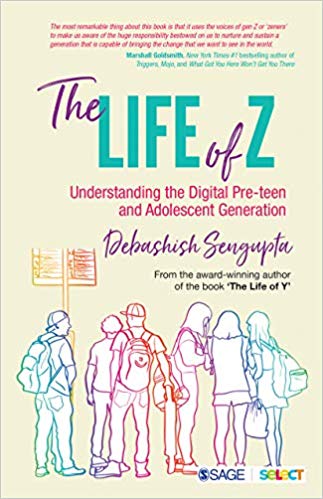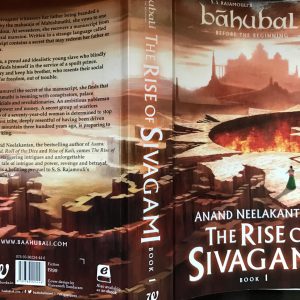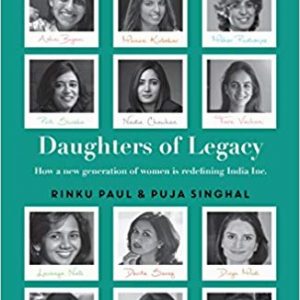Books about generational cohorts make for really interesting reading. The Generation Z, born in the year 2000 and after that, are a unique group who share some really dazzling characteristics, just like all cohorts do. These youngsters have been born in a world where modern technology and communication have pervaded every possible area of life. They have information on their fingertips and google at their disposal. The Life of Z – Understanding the Digital Preteen and Adolescent Generation by Debashish Sengupta (SAGE, 2020), aims to provide a well-rounded understand of this group.
The society at large has an investment in the Generation Z. After all, these are the people who will go on to make the future. They are the ones who will in a couple of decades form a chunk of the working force. If we understand the unique forces that drive this generation, we will be able to harness their skills in a better manner. Further, understanding the qualities and the motivations of this cohort will help schools and other educational institutes to tailor their offering in a manner that will bring out the optimum in these youngsters.
Bookedforlife chats with author Debashish Sengupta about The Life of Z
What is the one characteristic that clearly distinguishes Zeners from Millennials?
Millennials and Zeners are similar yet quite different. Their difference can be summarized in ten word-sets –
- Real-Virtual versus Virtual-Real: Millennials became the first generation who created a seamless existence for themselves parallelly in the real and the virtual world; Zeners on the other hand are so much into the virtual world that they have started believing the virtual world to be real. No wonder virtual-reality is a big sell.
- Social versus Vocal: Millennial have always been found to be a very socially-conscious generation who care for the society, environment and earth. They like to associate with brands that are socially responsible whether as employees or customers. However, Zeners have taken a step forward and they are not only social but extremely vocal about these issues. Greta Thunderberg leads the charge.
- Natives Versus Wizards: Millennials, no doubt are the digital natives with their head and heals into technology; however, Zeners were born in the cradle of technology, rocked by Instagram and fed by the AI and automation spoon. No wonder Zeners are the real wizards when it comes to technology.
- Curious versus Inquisitive: Millennials are a very curious generation, and thanks to their curiosity that they are so creative and innovative; However, Zeners are not only curious but extremely inquisitive. They do not hesitate to ask question and question almost everything before believing or accepting.
- Transformers versus Reformers: Millennials and their choices have transformed many things in the organizations and society. It is more of an induced change. However, Zeners are more like reformers who believe in wielding the baton of change themselves, rather than just inducing it.
- Creative versus Entrepreneurial: Millennials are highly creative, great at producing ideas. However still majority of them are jobseekers, then being job-creators. Millennials have created and are still creating a lot of value for the organizations with their ideas and creativity. However, Zeners are truly an entrepreneurial generation. There are examples where they have turned entrepreneurs even before they have graduated from their high schools.
- Skeptics versus Conscious: The world in which millennials were raised saw rapid disintegration of trust. Hence, they turned-out to be skeptics, checking before believing. Zeners have learnt from the experiences of the millennials and can be termed as the generation that is conscious of their rights, so early in their lives.
- Gullible versus Vulnerable: The online world-wide web loaded with correct and incorrect information created a lot of gullibility among millennials. But the real dangers of the real and virtual world are faced by Zeners that makes them highly vulnerable. From bullying to cyberbullying, substance abuse issues, manipulative online games like blue-whale challenge, growing sexual abuse of kids and teens, the dangers lurk around every corner.
- Busy Parents versus Absent Parents: Baby Boomers, the parents of millennials were always busy trying to create subsistence for themselves and their kids. But in case of Zeners, their parents – the Gen Xers and older millennials are virtually absent – partly because they are too sucked-up in the rat race of this competitive world and partly because technology has created islands of isolation insides homes.
- Lonely versus Loners: Millennials grew up with busy parents, virtual connections whom they thought as friends and became one of the loneliest generations the world has seen. Zeners on the other hand facing the ‘absent parent’ phenomena are fast becoming loners, who like to be alone. This is worrisome and can have far reaching consequences on their mental health and social structure in the years to come.


One of the interesting things that you point out in the books is that while the Zeners are more intelligent and have greater potential than previous generations they are less emotionally resilient. What are the specific tactics that you believe parents at the individual level and society or educational institutions at the macro level must employ today to introduce this feature in the generation Z?
Parents share the maximum responsibility since their skin is in the game when it comes to their children. The best thing that they can do is to understand the value of time they spend with their children. And, it is not just spending qualitative time, it’s also about spending enough time with their children.
Empathy is the second most important thing to remember. Understanding their life, their issues, their dreams and what they aspire for is more important than imposing their unfulfilled desires on their children. Zeners are empowered by information and armed with advanced technology. They need guidance and not sermons. Communication – open, free and two-way is critical to manage zeners. They up-age, are daily exposed to hundreds of inappropriate things online and otherwise. In such times, communication is the only savior. Parents need to create an environment of trust and a safe zone where zeners can share anything without fear or shame. “I am not Pizza Hut, I do not take orders” – Yes, that’s exactly how zeners react when they are given commands. Leading by example works best in pursuing them to act in a particular way. There are so many aspects but one more thing worth mentioning is teaching them to deal with failures. You either win or learn, you never fail – this message needs to be driven home by parents. Zeners growing-up in this hypercompetitive world, pushed by competitive parents, driven by teachers and egged by peer pressure have unfortunately not learnt well how to deal with failures.
Educational institutions and teachers need to understand one thing clearly that the kids and teens of today – the zeners do not need school anymore for quenching their thirst for knowledge or information. There is plenty and more available on the world wide web. They need schools for learning and knowing the relevance of what they are learning in their real lives. Teachers no more will be accepted as ‘Sage on the Stage’, instead they are ‘facilitators on the sidelines’. Guide not Guru, is what Zeners need. Modern education needs to be liberated and choice-based vocational credits, pedagogical techniques like gamification and many more need to be embraced to create a generation of innovators.
Society, in general needs to be empathetic, see this generation from a defogged lens and with a fresh perspective. Only then they will make good sense of what zeners are about and connect with them as entrepreneurs, marketers, non-profits etc.
Your book points out to the very crucial role of parents and parental communication. What is the one top tip with respect to communication with gen Z that you want to give our readers?
Communication needs to open, free, two-way and regular. It should create an environment of trust and a safe zone where zeners feel free to share anything under the sun without any fear or shame. Understanding the unsaid is equally important, in other words, understanding the non-verbal cues to ensure that something that bothers zeners does not remain bottled-up. Effective communication needs time, patience and attention.
What do you want readers to take-away from the book?
My work traverses the areas of generational research, human behavior and social psychology. The Life of Z – Understanding the Digital Preteen and Adolescent Generation deals with Generation Z – the preteens and teens of today, attempting to understand the attitudes, behaviours and life realities of this generation of influencers and change makers.
This generation assumes importance for couple of reasons – one that they make up the biggest chunk of the world population (close to 32%); second that they exhibit transformed behavior considering that they have been and are growing in times that are drastically different then they have been for the previous generation; third, that both the stakeholders and institutions who manage and engage them appear to be at loss as to how to deal with this generation. Parents, teachers, counsellors, entrepreneurs or institutions like schools, colleges and businesses find it difficult to comprehend how to engage them as a cohort, stemming mostly out of poor understanding of them and their life. Fourth, and most importantly, that we still have a chance to make course correction by developing a deep empathy about this generation, the ones who hold the stake to the future of this planet, along with the millennials.
This book is an attempt to serve as a consultative guide and help create a right and thorough understanding of this generation. It is dedicated to not only understanding zeners and their life, but also in exploring how the different stakeholders of this generation – parents, teachers, or anyone else can connect, engage and manage them, a kind of consultative guidance, based on research and experiences. The goal is not only to create and maximise opportunities for them but more importantly to raise them as a happy and mentally healthy generation. There is no better investment than to raise them as happy functional kids who do not forget to explore, experience and experiment.
If you enjoyed reading about Generation Z, you may also like reading about Millennials in the Workplace.




